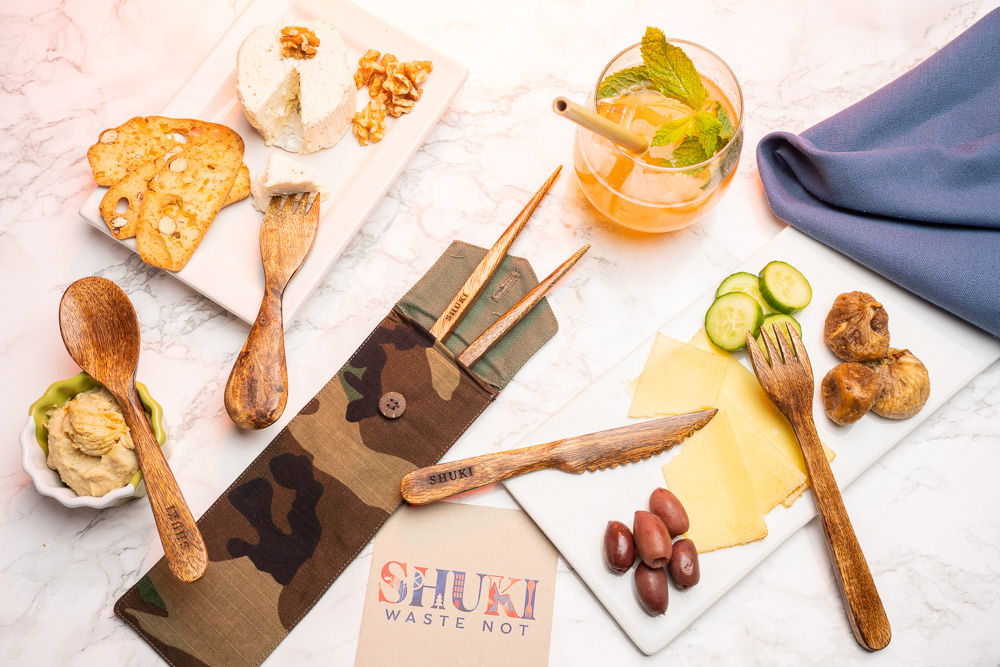What to have for living in a van
- The vanlife movement that's been gaining traction on social media for the past decade has been perpetuated by a pandemic-fueled desire for freedom.
- Vanlife, whether temporary or permanent, is intimidating but made easier by innovative camping accessories, organizing tools, and digital resources.
- Here's a basic list of tips and vanlife essentials, so strap in. We're going on a trip.

The fantasy of traveling indefinitely, living with few possessions, and waking up to new scenery daily has coaxed many a free spirit away from the status quo and into van, car, or RV living. The #vanlife trend promptly took off after photographer Foster Huntington coined the Instagram hashtag in 2011. It has since amassed 12.4 million Instagram posts and an astounding 8 billion views on TikTok.
Besides providing the freedom we all desperately desire, moving into a van can also be a good move for the environment. Sure, transportation is the U.S.’s second biggest greenhouse gas-emitting sector, but can you guess which is the first? Electricity—from houses.
Doubtless you’ve seen the benefits of nomadic living all over social media. The assault of inspirational captions and stunning photos that litter the internet answer the why; the bigger question is how? How does one simply downsize from a brick-and-mortar home with furniture and all the fixings to a 20-cubic-foot steel box on wheels?
I’ve lived (intermittently) out of vans and tents all over the world since 2016, and these are the tips, tricks, and necessities that kept me road-tripping year after year.
Space-Saving & Organizational Hacks
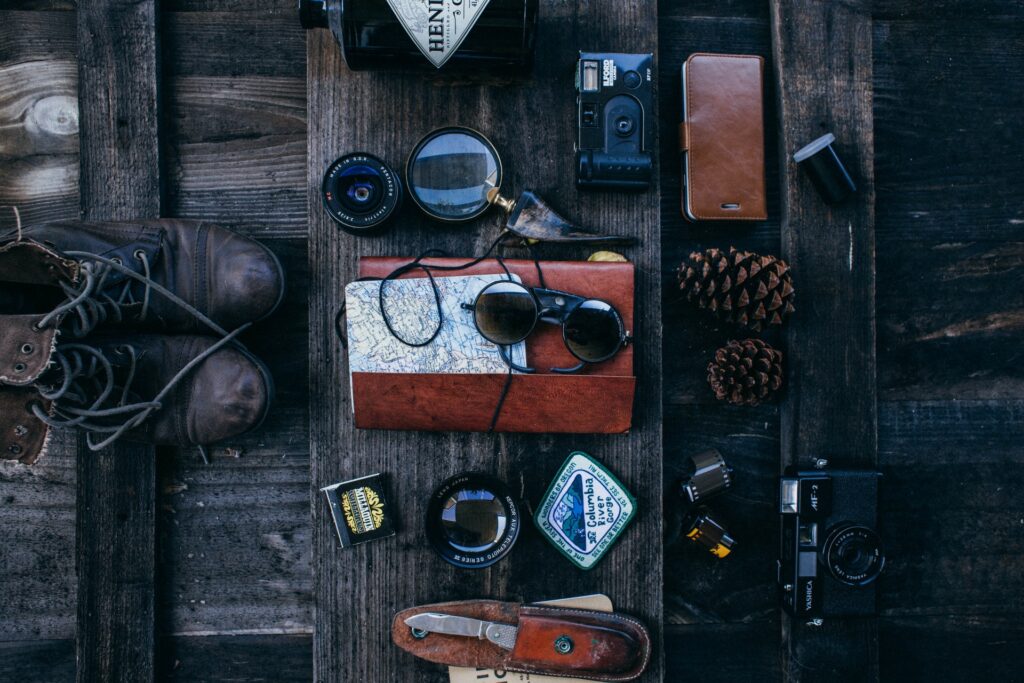
Without impeccable organization and space-saving skills, surviving in a single room that you can barely stand up in can be anywhere from uncomfortable to downright infuriating. Here are some things to remember.
- Multifunctional items are a vanlifer’s best friend. Think: solar lights that double as speakers, soap that you can use on both yourself and the dishes, double-sided cutlery, and other Swiss army knife-type things.
- Pack smart. Use packing cubes, and roll your clothes instead of folding them. In fact, roll everything. Roll your jewelry, even.
- Opt for collapsible, stackable, and compact kitchen items, such as frying pans with foldable handles, a reusable coffee filter instead of a clunky French press, triangular plates for corner storage, and a multipurpose collapsible bucket.
- Hang a mesh produce bag to keep your fruits and vegetables in so they’re not rolling around in the pantry and, inevitably, on the floor when the van is moving.
- Separate your belongings into small containers with the things you use most frequently in the most accessible places. Tie everything down with magnets, bungee cords, or Velcro.
Vanlife Hygiene
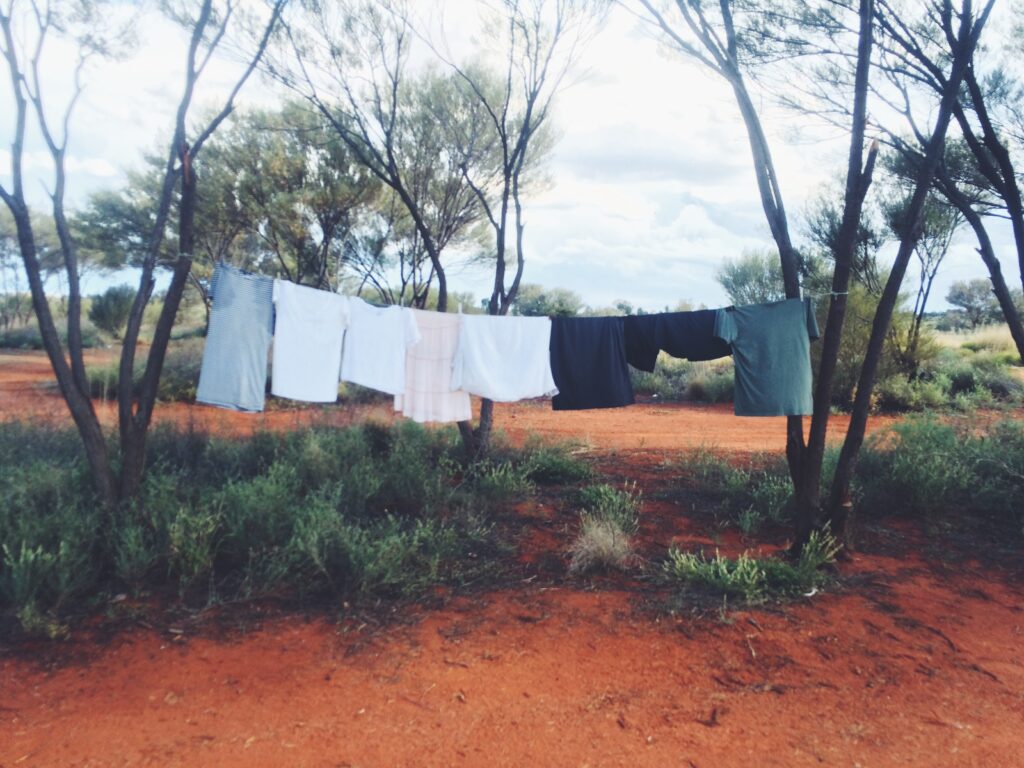
One of the most common misconceptions about vanlife is that you must sacrifice hygiene for it. Truth is you can still maintain a respectable level of cleanliness if you’re willing to let go of traditional ways of cleaning. Often, the methods we’re used to are the most convenient.
- Shower anywhere with a portable camping shower—essentially, a five-gallon bag that’s black on one side so it heats up in the sun. Hang it on a tree branch or on your van and let gravity draw the water through the showerhead hose. (Only use natural, biodegradable, soil-friendly products with this or catch and properly dispose of your grey water.)
- Trade your bottles for bars: bar soap, bar shampoo and conditioner, bar dish detergent. Bars are plastic-free, compact, and they last longer because they’re more concentrated than watered-down liquid formulas. And while you’re at it, switch to laundry strips.
- The regular old terrycloth towels you’re accustomed to aren’t going to cut it in the van. Switch to a quick-drying material like polyester. You can reduce the impact of synthetic fibers by getting a travel towel made of recycled plastic bottles.
- Instead of purchasing filtered water in plastic bottles, filter your own water from public fountains with a charcoal stick.
- Use only reef-safe sunscreen and nonchemical bug repellent.
Zero-Waste Travel Necessities
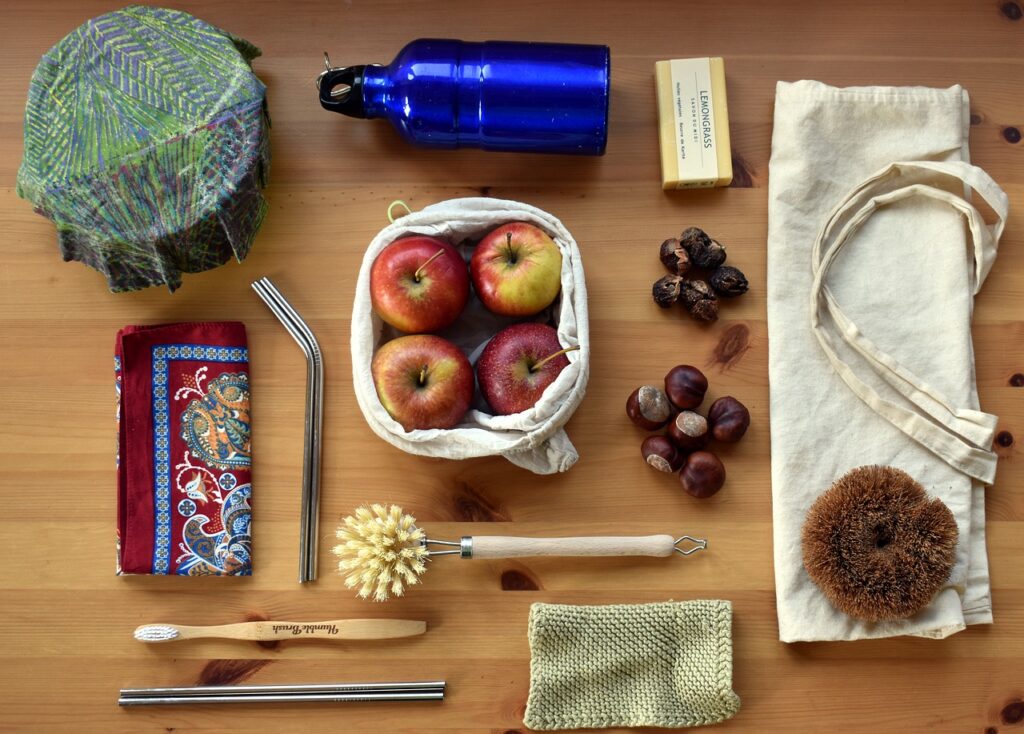
While it can be tempting to reach for disposable items while traveling for convenience’s sake, it’s generally cheaper and more sustainable to buy reusable items. As a bonus, less packaging means more space.
- Take reusable totes and mesh produce bags shopping. Better yet, shop for produce and pantry items at zero-waste stores to avoid a mess of plastic in the van.
- Eliminate all packaging from the pantry and keep food in reusable zip-top bags.
- Too lazy to make coffee? Take your espresso in a travel mug instead of nonrecyclable paper cups.
- Choose plant-based cutlery designed for traveling. It’s more compact and lightweight than metal (ideal for zero-waste picnicking and hiking).
- Reusable “paper towels” are handy for everyday spills and perpetually dirty van floors.
- Use a dish brush instead of a sponge. Not only does a dish brush last longer, it’s also easier to keep dry and clean.
Portable Gadgets

Some people equip their vans with intricate electrical systems while others prefer to stay off-grid. There’s no denying that a little bit of juice is essential to keep devices charged, if only for emergencies.
- Almost everything can be made with solar panels these days: coolers, portable ovens, even camp tables. It certainly doesn’t hurt to carry a foldable solar panel and power bank for charging up phones, laptops, cameras, etc.
- For something more portable, there’s also pocket-sized solar chargers that weigh less than a pound.
- No road trip would be complete without a USB in-car charger that plugs into the auxiliary power outlet.
Digital Resources
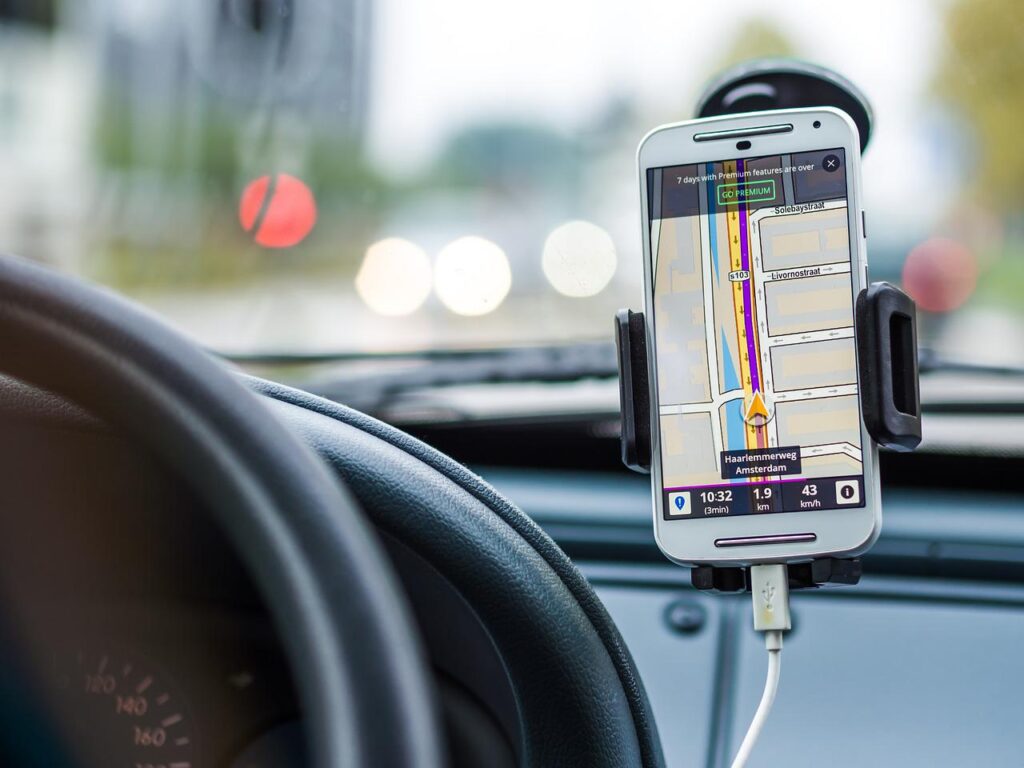
Even the most tech-averse vanlifers use apps for navigation or to find campsites and other resources like toilets, water refill and dump stations, and so forth. Here are some you’ll probably want to download.
- In addition to the standard navigation apps—Waze, Google Maps, etc.—Maps.me is especially helpful for downloaded maps that you can use offline. Maps.Me often includes hiking trails and forest roads that others don’t pick up.
- Opensignal is an app that provides mobile network coverage maps even more precise than the ones provided by carriers. This can help a vanlifer know whether a prospective campsite will have service and test the speed of connectivity for remote work.
- Apps are almost essential in finding camp spots in unfamiliar territory. These include The Dyrt for both public and private campgrounds, iOverlander and WikiCamps for user-generated campsite recommendations, and Recreation.gov for federal campgrounds.
- Also, let’s face it: Nights in the van can be long and boring. The audiobook app Audible and Libby, which gives you digital access to your local library, can provide endless entertainment on those nights.
Vanlife Shopping List:
Space-Saving & Organizational
- Luci Explore Solar Light, Speaker & Charger on DoneGood
- Dr. Bronner’s Unscented Pure-Castile Liquid Soap on Hive
- Artisan Mango Wood Spork Kit by Shuki
- Cotopaxi Cubo Uno Del Dia Packing Cube Bundle on EarthHero
- Wayfarer Jewelry Roll Travel Case on DoneGood
- CoffeeSock Portable Travel Coffee Filter on EarthHero
- Light My Fire Biobased Stacking Plates on EarthHero
- Mesh String Bag on Hive
Vanlife Hygiene
- Vegan Shampoo and Conditioner Bar Bundle on Zero Waste Store
- No Tox Life Vegan Dish Block on Zero Waste Outlet
- Tru Earth Eco-Strips Laundry Detergent on Zero Waste Store
- Nomadix Grand Canyon Recycled Towel on EarthHero
- Kishu Charcoal Water Filter Stick on EarthHero
- Mountain Mel’s Good Day Sunshine Mineral Protection Herbal Sun Care on DoneGood
-
5-in-1 Moisturizing Face Sunscreen Tinted SPF 30 on SunTegrity
- Mountain Mel’s Quit Buggin’ Moisturizing Insect Deterrent on DoneGood
Zero-Waste Travel Necessities
- Organic Colored Mesh Produce Bags on Zero Waste Outlet
- Reusable Food Storage Bag Trio on Hive
- Hydro Flask Coffee Mug on EarthHero
- Knork Flatware Plant-Based Fork + Spoon Set With Travel Case on EarthHero
- Reusable “Paper” Towels by Papaya Reusables
- Bamboo Dish Brush on Hive
Portable Gadgets
- Chillest Solar Cooler by GoSun
- Go Solar Oven by GoSun
- SolarTable 60 by GoSun
- SolarEnergy 1100 Panel and Powerbank by GoSun
- Chandler Charger on Simple Switch
- Dual USB Port Dual QC2.0 Car Charger by Rexing

